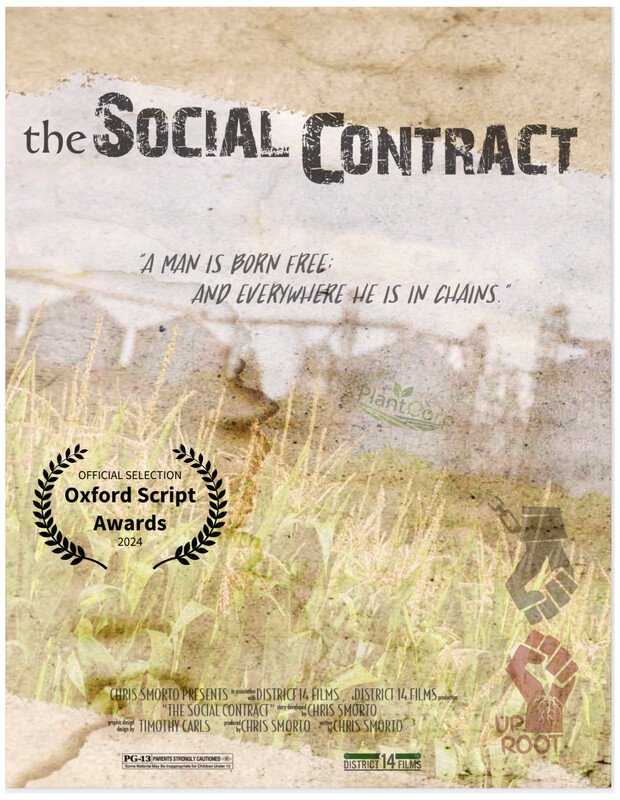
In The Social Contract, Chris Smorto invites viewers into a harrowing world where corporate greed has destroyed the American dream, replacing it with a grim dystopia where freedom is traded for survival. PlantCorp, a ruthless agribusiness empire, controls everything: food, water, and lives. At its center is Athena, the estranged daughter of PlantCorp’s formidable CEO, Roger Small. She is a woman torn between loyalty to her bloodline and the desperate need to save her own child—a daughter she’s never known, born from a forbidden love.
Smorto crafts a story that’s as emotionally charged as it is politically resonant. The pilot opens with heart-stopping intensity—a daring escape that sets the tone for a world fraught with danger. The narrative then unfurls like a tapestry, blending Athena’s covert journey to rescue her daughter with the broader fight for liberty led by a modern-day Underground Railroad. Each character, from the morally conflicted Judas to the tyrannical Roger, adds rich texture to the story, making every choice and betrayal feel achingly human.
What sets The Social Contract apart is its masterful balance of personal stakes and societal commentary. Smorto’s script doesn’t just show us a dystopian future; it pulls us into it, forcing us to grapple with the moral compromises and fractured relationships that define this world. The dialogue crackles with intensity, particularly in moments where ideology clashes with personal desire, leaving viewers questioning where they would stand in such a fractured society.
Beyond its narrative depth, the script brims with cinematic potential. Smorto paints vivid scenes of sprawling plantations worked by the enslaved, high-tech drones hunting rebels, and the stark contrast of opulent corporate boardrooms. These visuals promise a show that’s both visually stunning and emotionally devastating.
This is not just a tale of survival—it’s a story of hope and resistance. Athena’s journey, fraught with danger and discovery, mirrors the resilience of humanity. Her secret alliance with the Underground Railroad and her battles against both her father’s empire and her inner demons are compellingly interwoven, making every twist and reveal unforgettable.
If you’re looking for a story that grips you from its very first frame and refuses to let go, The Social Contract is it. Smorto delivers a script that’s bold, timely, and deeply human—a dystopian epic with a beating heart.
- Concept/Originality (8/10)The premise is both thought-provoking and chilling: a future America where corporate interests have reinstated slavery to control the economy. The tension between the personal stakes (Athena’s estranged daughter) and the broader societal rebellion makes for an engaging, layered narrative.
- Structure (7/10)The script adheres to conventional pilot structures, with clear setups for key characters and conflicts. The opening sequence is intense and hooks the audience effectively, but transitions between action and exposition occasionally feel abrupt, causing a slight disruption in narrative flow.
- Plot (8/10)The plot is engaging, weaving personal and political storylines seamlessly. Athena’s secret identity, Judas’ infiltration, and the Underground Railroad’s resistance create a complex web of motivations.
- Pacing (6/10)While the script starts strong, some scenes—particularly dialogue-heavy ones—slow the momentum.
- Characters (9/10)The characters are compelling and multifaceted. Athena’s internal conflict as both the heir to PlantCorp and a mother adds depth, while Judas’ moral dilemmas make him a sympathetic yet conflicted protagonist. Roger Small is a suitably chilling antagonist, embodying the corruption of power. Supporting characters like Corso and the Underground Railroad leaders are introduced with enough intrigue to promise meaningful development.
- Dialogue (7/10)Dialogue is functional but occasionally too on-the-nose, especially during expository moments.
Writer Biography
Chris Smorto
Chris has worked on such critically acclaimed films as THE GOOD LORD BIRD, HARRIET, DOPESICK, and RAYMOND & RAY. And most recently on Francis Ford Coppola’s MEGALOPOLIS and Taylor Sheridan’s LIONESS. His role as stand-in’s for actors like Ethan Hawke, Ewan McGregor and Dave Annable afforded him the ability to work with talented directors and cinematographers like Peter Deming, John Toll, Albert Hughes, Kasi Lemmons, John Hillcoat and Anthony Brine. Chris has produced three narrative short films and won four awards. He is also writing his first feature screenplay with the Sundance Collab Screenwriting classes and in development with his first episodic screenplay.

